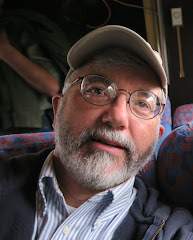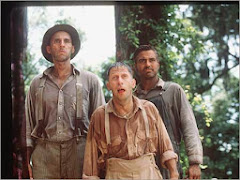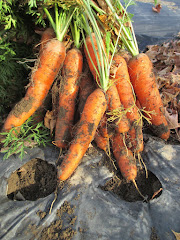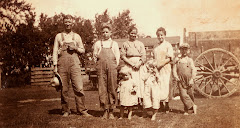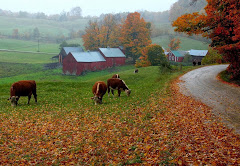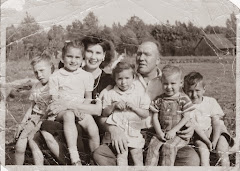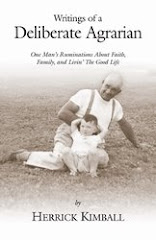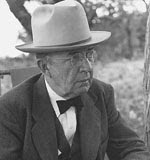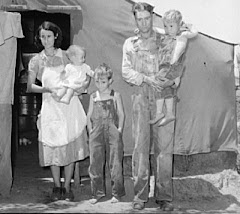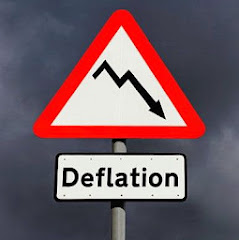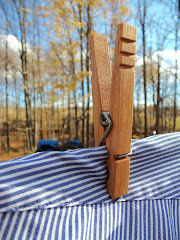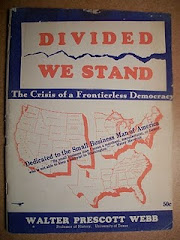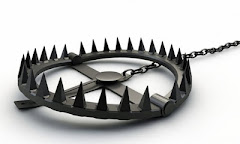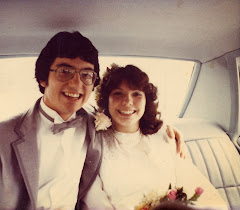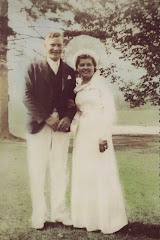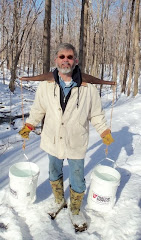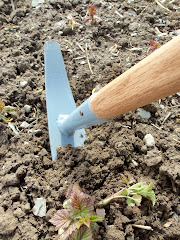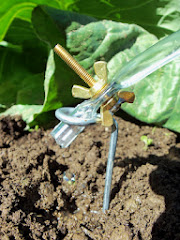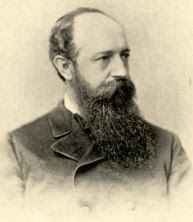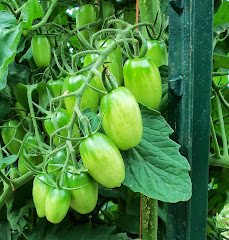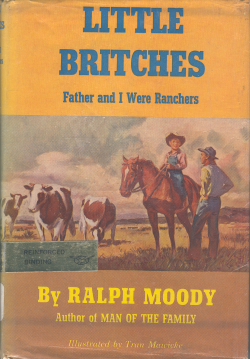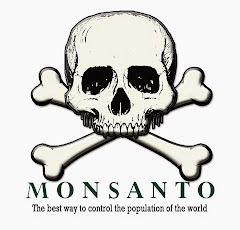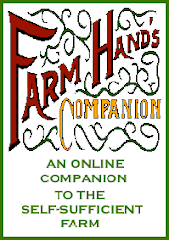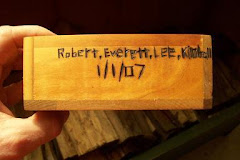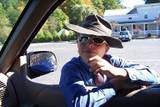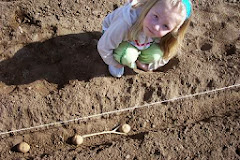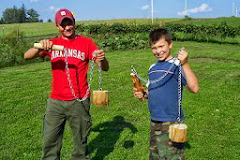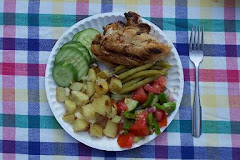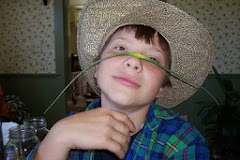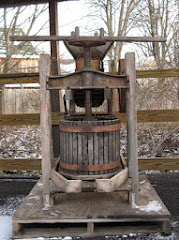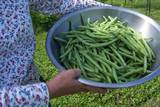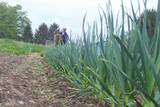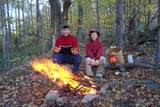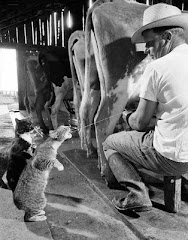Dateline: 30 October 2014
 |
| Kennebecks on the top and Yukon Gold on the bottom |
I'm relieved to report that my 2014 crop of potatoes is now dug and in the basement. I got a decent yield from about 240 feet of rows. The best and biggest spuds are now in the basement, and we were able to share some of the harvest with three other families. Now I can cross that off "the list" and move on to other pressing tasks, like getting this year's firewood split and stacked…
 |
| Futureman at work |
My two-year-old grandson (a.k.a., Futureman) "helped" me dig the potatoes this year. He now knows where potatoes come from, how to pick and place (not throw) them into a container, and that they get stored down in the basement.
Now the eating of potatoes at the dinner table takes on new meaning. It involves shared memories of harvesting and putting the crop away. Next spring, I'll have Futureman help me plant the crop. And by then, maybe he will be able to say "potato."
Futureman can repeat the syllables. "Po"… "ta"… "toe". But he can't put them together yet.
Mostly, he calls them "toes."
The child's wooden wheelbarrow in the two pictures above (click pictures to see enlarged views) is an antique that I recently bought. It's a good size for a two-year-old. I bought it as much for the inspiration as for my grandson.
I hope this winter to find time to develop plans for a similarly-sized child's wheelbarrow. I will offer the plans as an inexpensive PDF file. Every rural child should have a first wheelbarrow. In time, I also hope to come up with plans for an adult version.
 |
| chopped peppers on a tray to be frozen |
In retrospect, this year's garden was probably the best I've ever had. Marlene takes care of growing the peppers. She also has a few blueberry bushes. I take care of everything else. And she cooks what I grow. The pepper pieces pictured above were frozen on the tray, then put into bags. I took that picture to use as my screensaver image (click for an enlarged view).
Speaking of gardening, I listened to the Survival Gardening Secrets audio-book (pictured above) this past month.
Most of the audio presentation is done by David Good, of the Florida Survival Gardening blog, and David has done a remarkably good job with this product. He has a great audio persona.
Presentation aside, the audio book really is packed with truly useful information for anyone who wants to learn how to garden.
Personally, I know how to garden pretty well but I'm open to learning new things. For an experienced gardener, this audio book is the equivalent of comparing notes with another experienced gardener, which is something that I always enjoy doing.
In addition to David's discussion, there is an excellent, informative introduction to seed saving by Lucinda Bailey of Texas Ready. Another presentation by Paul Wheaton of Permies.com (on the subject of permaculture) is good, but marred somewhat by a few profanities.
In the final analysis, I thoroughly enjoyed listening to David Good's "Survival Gardening Secrets."
The above-pictured book is just-published and should be of interest to anyone who is yearning to break away from the rat race of wage slavery by making a living at home, on their land. It is exactly the kind of book I would have bought when I was a teenager.
Fact is, I did buy several books along the same lines back in the 1970's. One, in particular, that I remember (and probably still have somewhere) was How To Make a Living in The Country (Without Farming), by William Osgood.
How to Make Money Homesteading includes "18 inspirational real-life profiles," one of which is my story, which is to say the story of my Planet Whizbang homestead business. You will, of course, want to get a copy just to read my profile. :-)
I confess… I haven't had time to read How to Make Money Homesteading
Marlene and I were recently at a Mennonite grocery store and gravitated to the book department. We bought a copy of To Train Up a Child, by Michael and Debi Pearl and started reading it. Though we haven't finished reading, our impression is that this is a profoundly good book on child training.
But it turns out the book is very controversial. When I see the media animosity directed towards Michael Pearl for what he has written in the book, I'm kind of shocked.
I always thought that parents were supposed to train their children to listen and obey. This can be, and should be, done without anger or abuse. The Pearl's book outlines how to train a child without anger or abuse. It's a sensible book. I think the parents of America should be embracing the wisdom in this book!
I can relate to what the book teaches because it is, essentially, the way Marlene and I trained our children to behave and listen to us. Our children never misbehaved in public when they didn't get their way. And it didn't happen at home either. Neither Marlene nor I were the kind of parents that yelled at our kids (or each other). Our children grew up in a peaceful, loving, Christian home.
I don't think my sons fully appreciated the blessings of their home life when they were growing up, but they have come to realize how rare our home was as they've gotten older. I just hope they are able to raise their children in the same kind of home atmosphere.
Anyway, back to the Pearl family…. If you have young children, or grandchildren, I encourage you to watch The Fruit of Child Training Webinar on YouTube. What a pleasure it is to watch the Pearl family and listen to them discuss how they were raised. It is obvious that this is not only a Christian family, but a Christian agrarian family. And a deliberate Christian agrarian family at that.
One of the comments to the YouTube video is worth posting here…
"I heard the things the media were saying about your book, and about you. My 1st reaction was horror. I bought your book and read it myself, and now I know that the media lied about you. I wish your book had been available when my children were young. May God Bless you and your family."
 |
| A "new" energy drink. |
As yet another example that "agrarian" is trendy, there is now bottled switchel. The Vermont Switchel Company boldly declares on their web site: "Our Agrarian Heritage in a Bottle."
The Vermont Switchel Company's switchel is made with apple cider vinegar, maple syrup, ginger, lemon and molasses.
Then there is Up Mountain Switchel, which plays on it's Vermont connection, but is made in Brooklyn, New York. Up Mountain Switchel is just vinegar, maple syrup and ginger.
I've had switchel a few times in my life. I liked the novelty of it. I liked the traditional-historical aspect. I liked the healthful qualities. But I didn't much like the taste. However, if I'm ever someplace where Vermont Switchel or Up Mountain Switchel is for sale, I'm going to give it a try.
I've blogged here a couple times in the recent past about ebola and colloidal silver, wondering if ebola is truly a threat and if colloidal silver may be an effective treatment or preventative.
Something doesn't "add up" with ebola in the US. I can't quite put my finger on it but this whole thing, as it is unfolding, doesn't make sense to me at the moment. So I'll put my ebola comments on hold.
But I'm convinced that properly made colloidal silver is an effective treatment for any kind of bio-infection. And, after thinking about it for several years, I decided to buy a "silver generator" that is more advanced than my 9-volt battery generator (that I haven't used in a very long time).
I got the Silver Lungs "system." Delivery time is four weeks out. I think a lot of people are buying these things.
 |
| One of the 2014 Classic American Clothespins |
For those who missed my most recent Planet Whizbang e-mail newsletter, this year's production run of Classic American Clothespins is scheduled to go on sale the morning of December 1st. I am pleased with how these clothespins turned out and will have approximately 10,000 clothespins to sell. First come, first served.
 |
| The Toe-Tapper Faucet Switch |
Some of you may recall the Toe-Tapper Faucet Switch I made and Sold Here Back In June. I've gotten feedback on the switch from a few people but not many.
If you purchased one of the Toe-Tappers and used it, please e-mail me or leave a feedback comment below. A Farmshow magazine editor has expressed some interest in the Toe Tapper. I can forward all honest feedback on the prototypes to him.
I have no plans to make and sell these Toe-Tappers in the future. I will, however, put the specifications together in pdf format and make them available for a couple of dollars. That is a this-winter project.
One person has contacted me about producing Toe-Tappers to go with an outdoor fish-cleaning table he makes. As far as I'm concerned, anyone who wants to make Toe-Tapper faucet switches and sell them can go right ahead and do so. I don't want anything from it. All I would ask is that you give credit where credit is due and let people know I developed the idea. That way I get a little marketing exposure (PlanetWhizbang.com) from it. Thank you.
A Change In This Blog
The US Postal Service found me this last month. I got a call from a regional representative. He wanted to stop by and meet me and maybe help me save some money with shipping. The fellow stopped by for a half hour or so. He was was downright nice and genuinely helpful… not what I expected from a government employee.
I spent over $53,000 in postage last year, shipping over 4,000 packages. I think it will be even more this year. Planet Whizbang continues to grow, and I am continually boggled by it.
Back in December of 2007, when the business was much smaller (and it was named, Whizbang Books), I posted a blog titled, For Sale: Whizbang Books (The Business). Some people wrote expressing an interest in buying the business. The blog post was up only a couple of hours before I quickly removed it. I changed my mind.
Here is part of what I wrote at that time…
Years ago (the 1970s), there was a business similar to what I believe Whizbang could be. It was called Garden Way. The business published how-to books, sold cider press kits, rototillers, garden carts, and a whole lot of other products for the homesteading crowd. Garden Way tapped into a growing trend for getting back to basics. Garden Way became a multimillion dollar business.
Whizbang Books could easily be another Garden Way. There are so many possibilities for building on the Whizbang foundation that I have established. But I’m not sure I’m the person to make this business much bigger. I work a regular full-timejob to provide for my family and it leaves little time for Whizbang expansion. My mind is not geared for marketing and big mail-order business. I don’t even have a computerized list of my customers. I don’t do bookkeeping very well. I don’t like to talk on the phone. I am reluctant to spend the money it takes to expand. For that matter, I don’t even have the money to spend to expand. I do not “think big enough.” That is what I’ve been told, and it is probably true.
I’m more of an idea person. I like to create things. As much as I would like to do it (and to a small degree am doing it) developing a big, profitable, mail order business is not necessarily something that suits me. That’s just the way I am.
This last year saw enough growth at Whizbang Books that I am wondering if I can continue to handle the demands if the business grows much more. There is only so much that one man, with a little help from his family, can do in a part time capacity. So, today, as I was working in my shop, it occurred to me that I should offer the business for sale.
It's kind of funny for me to read what I wrote seven years ago, and how I felt about my business. It's funny because the business has grown, I'm still the same guy, and I'm still overwhelmed.
At this point, I'm not looking for a buyer, but I am looking to get more organized and efficient in the small space I have to operate out of. I'm also intent on getting ahead on much of my product inventory (this things that require manufacture or assembly on my part) through the slower business months of winter.
That is one reason I am deciding to cut way back on my blogging. I need to focus on doing more productive work and running my business more efficiently. If I can do this, I will have more time next summer for doing the other things of life, like, for example, keeping my lawn mowed, doing some long-overdue home repairs, and spending more one-on-one time with Futureman. As much as I love it, working at the business 12 to 14 hours a day, all summer, is getting to be too much.
The other reason I need to cut back on blogging is that my eyes are beginning to really bother me. I spend way too much time staring into a computer screen answering customer e-mails and processing orders. My vision is getting worse, and I'm getting concerned about it.
So, as it stands now, I will be blogging only once a month, on the last day, like I have done today. This new blogging format will be similar to the Monthly Blogazines I posted here from April 2009 to March 2013. But the Blogazines tended to be longer productions with more thoughtful ruminations. My new format will, of necessity, reflect less depth of thought and be more brief.
My thanks to all of you who read this blog, and who often comment. I have learned from you and been blessed by your insights. I hope you will continue to meet me back here, Lord willing, on the last day of every month.
Herrick Kimball
10/31 Update...
David Good has suggested to me that a better approach to my blogging dilemma might be to write several short blogs at one time, then post them through the month. He says, for example, that this end-of-month blog post could easily have been broken into five separate posts.
That makes sense to me. Shorter posts are probably better than longer ones because most people are not inclined to read a long post. I know this is true when it comes to newspaper editorials. If an editorial is only a few sentences long, more people read it as compared to the long-column editorials.
So I'm rethinking my approach here. I'm going to take the month of November off so I can focus on getting my clothespins finished for the December 1st deadline, then I think I'll implement David's suggestion.
Short, sweet, and frequent blog posts. That's what David does at Florida Survival Gardening and it is also what Mark and Anna Hess do at Walden Effect. Thanks, David!









